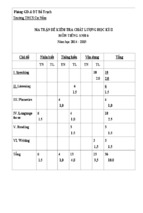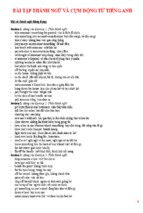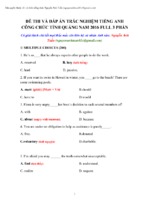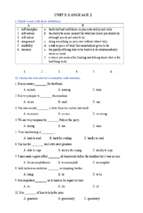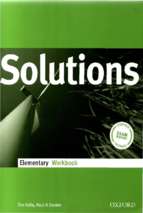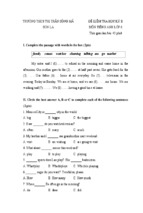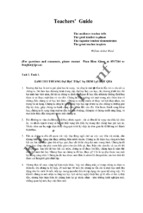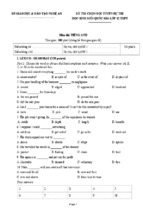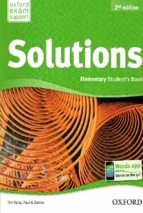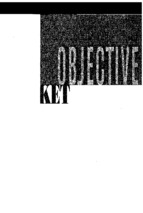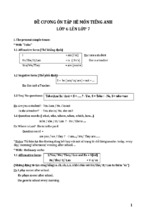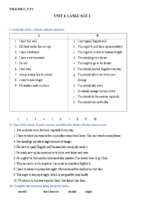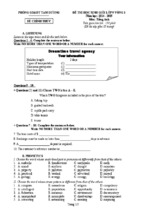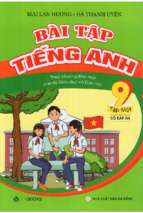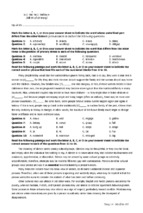english_9_student_s_book
Скачано с сайта www.aversev.by
Скачано с сайта www.aversev.by
УДК 811.111(075.3=161.1)
ББК 81.2Англ-922
A64
А в т о р ы : Л.М. Лапицкая, Н.В. Демченко, А.В. Волков, А.И. Калишевич, Т.Ю. Севрюкова, Н.В. Юхнель
Р е ц е н з е н т : учитель английского языка первой квалификационной категории государственного учреждения образования «Средняя школа № 6
г. Минска» О.Н. Сысоева
Аудиозапись
Грамматический справочник
Электронный образовательный ресурс e-vedy.adu.by
Домашнее задание
Урок презентации проекта
Английский язык : учеб. пособие для 9-го кл. учрежA64 дений общ. сред. образования с рус. яз. обучения :
с электронным приложением / Л. М. Лапицкая [и др.]. –
Минск : Вышэйшая школа, 2018. – 303 с. : ил. + 1 электрон. опт. диск (CD)
ISBN 978-985-06-2928-9.
УДК 811.111(075.3=161.1)
ББК 81.2Англ-922
ISBN 978-985-06-2928-9 (отд. изд)
ISBN 978-985-06-2927-2
Скачано с сайта www.aversev.by
© Оформление. УП «Издательство
«“Вышэйшая школа”», 2018
Contents
UNIT 1. FAMILY RELATIONSHIPS . . . . . . . . . . . . . . . . .
4
UNIT 2. INTERPERSONAL RELATIONSHIPS . . . . . . . . . 29
UNIT 3. A HEALTHY LIFESTYLE . . . . . . . . . . . . . . . . . . . 53
UNIT 4. THE WORLD OF FASHION . . . . . . . . . . . . . . . . . 83
UNIT 5. WEATHER . . . . . . . . . . . . . . . . . . . . . . . . . . . . . . 116
UNIT 6. CLIMATE . . . . . . . . . . . . . . . . . . . . . . . . . . . . . . . 145
UNIT 7. LEISURE TIME . . . . . . . . . . . . . . . . . . . . . . . . . . . 185
UNIT 8. MEANS OF COMMUNICATION . . . . . . . . . . . . . . 215
UNIT 9. SCHOOL MATTERS . . . . . . . . . . . . . . . . . . . . . . . 246
Grammar reference . . . . . . . . . . . . . . . . . . . . . . . . . . . . . . . 277
Irregular verbs list . . . . . . . . . . . . . . . . . . . . . . . . . . . . . . . 292
Vocabulary . . . . . . . . . . . . . . . . . . . . . . . . . . . . . . . . . . . . . 294
3
Скачано с сайта www.aversev.by
UNIT 1
FAMILY RELATIONSHIPS
Lesson 1. Happy families are alike
1. Look at the four pictures and read the definitions below. Answer
the questions.
1. Which of the families is extended? Which is nuclear?
2. Which is a single-parent family? 3. What relatives does each
of them include? 4. Which one do you think shows a typical family of your country? Why do you think so?
a nuclear [] family – is a married family (a husband
and wife) and their children.
an extended [] family – in modern Western culture
the word refers [] to (относится к) grandparents, uncles, aunts, and cousins, in addition to a nuclear family
whether they live together within the same household or
not. In other cultures, it may refer to a family in which several generations (несколько поколений) live together within a single (one) household.
4
Скачано с сайта www.aversev.by
a single-parent [() ] family is one-parent family.
2. Think of a perfect family. Choose five things from the list, which
you associate with a perfect family. Compare your list with other
students’.
Friendship, big, united, love, happy, spend a lot of time together, comfort, respect, care, home, understanding, pleasure,
support.
3a. Work in pairs. Interview your classmate. Use the questions
below.
• How big is your family? How many members are there
in your family? In your extended family?
• Have you got any brothers or sisters? If so, how old are
they?
• What’s the best thing about your mum / your dad / your
siblings / your grandparents?
• What do you and your family like doing together?
• What is the best memory (воспоминание) you have of your
family doing something together?
siblings [] – someone’s sisters and brothers
3b. Report to the class what new facts you have learnt about your
partner’s family.
Help box
I’ve learnt that ... I was surprised that ... It was interesting
to learn that ...
4a.
Listen and read along what students wrote about their families in a teenage magazine. Are they all happy?
Alice (14)
I adore being with my family. My parents are my real
friends and they certainly mean a lot to me. They always help me
5
Скачано с сайта www.aversev.by
in difficult situations. It’s fun to spend time together. My family
is very important to me. I think it’s nice to have someone you
can rely on and share all your experiences with.
Brian (13)
I’m lucky to have such a wonderful family. We spend a lot
of time together, play together, and watch TV together. We are
a close-knit [] family and we would do anything for
each other. After all, without a family you have nothing –
that’s my opinion.
Liz (15)
We are in the same class at school and we have the same
friends. Well… we aren’t exactly the same – she’s taller and
thinner than me. And we also have different characters. If you
have a twin (близнец) you are never lonely – there’s always
someone to talk to, someone who will come to you if you need
a shoulder [] to cry on.
Andy (14)
Most people think that a perfect family is the one with many
children and I absolutely agree. I’m the youngest of five children. It’s great to feel that there are so many people who can
help you sort out your problems. Besides, I think that people
who have a strong family behind them feel more secure []
and confident and can deal with life better.
Alex (15)
Though we are only two – my mum and me, I’m lucky
to have such a close-knit family that sticks together. Of course,
you need your family’s support to rely on. We really get on well
with each other, spend a lot of time together, which is fun.
4b. Read the text again and match the words in bold with their
translations. Use the definitions as well.
1. rely [] on (v) – trust
somebody to do smth for you
6
Скачано с сайта www.aversev.by
a) сплоченная семья
b) ладить с
2. a close-knit [] family – made up of relatives who
do a lot of things together and
care for one another
3. a shoulder [] to cry
on – someone who listens to
you when you talk about your
problems
4. secure [] (adj) – safe
from any kind of attack
5. confident [ ( ) ]
(adj) – feeling sure about your
own skills and abilities
6. deal [] with (v) – take action and solve a problem
7. support [] (n) – help
and approval (одобрение) that
you give to somebody or something (an idea, a plan); support smb (v)
8. get on / along well with (v) –
have good relations (отношения) with someone
c) полагаться на
d) поддержка
e) «жилетка», чтобы поплакаться
f) справляться с чем-либо,
иметь дело с кем-либо
g) защищенный
h) уверенный
5a. Read 1–2 sentences from the teenagers’ statements to prove
that they have happy families. Work in pairs.
5b. Read the article again and choose 10 things, which make a family
happy. Use the vocabulary from ex. 4b and ex. 2. Work in pairs.
6. Fill in the missing words from ex. 4a and answer the questions.
Work in pairs.
Do you think you have a (1) ... family? Do you get (2) … with your
family? Who’s the easiest to (3) ... with in your family? Can you
(4) ... on your family members? Do you agree that a friendly family can make you more (5) ... and (6) ... ? Why? Are you always
ready to (7) ... your family if someone needs a (8) ... to cry on?
7
Скачано с сайта www.aversev.by
7.
Write a short essay ‘All happy families are alike…’ Leo Tolstoy, ‘Anna Karenina’.
Lesson 2. Can you recognize true beauty?
1a. Look at the pictures. Who’s got freckles, a pony-tail, straight
hair, curly hair, wavy hair, blond(e) hair, glasses?
Model: The girl in picture A has got ...
A
B
D
C
E
F
G
H
J
8
Скачано с сайта www.aversev.by
I
K
1b.
Listen to the descriptions and guess which pictures are described.
she’s in her early thirties [] – in her mid-thirties – in
her late thirties
2a. Read the descriptions and match them to the other pictures
(ex. 1a). Guess the meaning of the words in bold.
1. This person is a young adult with long straight brown hair
and hazel eyes. She’s got full lips and a wide forehead [].
2. This person is in his mid-fifties. He’s got an oval face and
he’s going bald.
3. This person is in his mid-teens with spiky hair. He’s got an
oval face, thick eyebrows and full lips.
4. This person is old with brown eyes and a moustache [].
He’s wearing an old-fashioned hat.
5. This is a middle-aged gentleman who’s wearing checked clothes
and glasses. He’s got a long beard [] and a moustache.
6. This is a young lady with long eyelashes [] and flowers in her blonde hair. She’s got a small nose, a long face and
has a lot of make-up on.
2b. Describe the two people in the photos who haven’t been described.
2c. Do you know any people who
– have got hazel eyes, a wide forehead, spiky hair, a moustache, a beard, long eyelashes?
– wear make-up?
– are going bald?
Are there people like that in your family?
3. Play a game. Write a description of a well-known person (or one
of your classmates). Let your classmates guess who the person is.
4. Describe the appearance1 of your family members.
1 appearance
[] – внешность
9
Скачано с сайта www.aversev.by
Year 9 → Unit 1 → Lesson 2 → My parents
(cloze test on articles)
Lesson 3. Relalionship is built around
personalities
1. Look at the picture and guess who
Susanne
Ted
John
Alice
Lucy
Tom
is sentimental, is charming and attractive, is interested in
fashion (мода), is very rich, is crazy about studies, is full of
beans, is crazy about shopping, is the breadwinner in the family, has a lot of interests, likes jogging, has no children, works
from home1, is strict, likes surfing the Net
sentimental [()] (adj) – feeling sadness, love, etc.
charming [] (adj) – very attractive
to be the breadwinner [] – earn money
to be full of beans [] – be very energetic
to be strict [] – make other people follow one’s rules
to take after somebody – look or behave like an older relative
2.
Now listen to Ted describing the photo of his family and
check your predictions. Guess who is missing in the photo.
1 works
from home – works at one’s house instead of the office
10
Скачано с сайта www.aversev.by
3.
Listen again and fill in the missing words.
y name’s Ted. I come (1) ... New Zealand. I’m 15 and I’m
a student. You can see me (2) ... the photo. I’m the youngest of the two children.
And this is my family. My mum Susanne. She’s in her (3) ...
thirties. She’s tall and has fair hair. She works from home but
that doesn’t mean you will always find her there. She’s very energetic, talkative and crazy (4) ... shopping.
This is my dad, Tom. He’s in his (5) ... forties. He’s a businessman. Five years ago he set up a building company here
in Wellington. He’s also a very energetic man, (6) ... of beans.
I think he’s the breadwinner in our family. I don’t think he’s
got any special hobbies but he enjoys reading books (7) ... history. He’s athletic and likes to play rugby.
Then this is my elder sister Lucy. She’s nineteen and she’s
a medical student (8) ... Wellington University. She’s (9) ...
about her studies and spends most time reading books. She’s
really friendly and understanding. She’s as charming and attractive as our mum. She’s got wonderful impressive eyes and
a winning smile. She likes expensive things and can’t (10) ...
boring people. And, you know, I sometimes think she talks too
much.
This is my grandad John. My father and I take (11) ... him.
He’s really kind-hearted. Something interesting about him is
that he’s got a lot (12) ... interests. He likes reading, travelling
(every summer he takes us to a few picturesque places), doing
yoga, jogging and, can you imagine, – surfing the Net!
I’ve also got a granny, Mary (13) ... name. I think she’s in
her (14) ... sixties. She used to be a college teacher but she is retired now. Though she looks a bit strict she’s really kind-hearted and soft. Sometimes I think she’s too sentimental, especially when at family occasions she tells us how she was bringing
(15) ... her children with love and care. She likes gardening and
spends a lot of time growing vegetables and flowers.
And finally, this is my cousin Alice. She isn’t married and
she has no children. She’s (16) ... her mid-twenties and she’s
a successful TV presenter. She’s very rich, I think. She’s interested (17) ... fashion and cars.
M
11
Скачано с сайта www.aversev.by
4. Are these statements true or false about Ted’s family? Correct
the false statements.
1. Ted takes after his dad and grandad. 2. His mum is in her
mid-forties. 3. Ted’s sister is the breadwinner in the family.
4. His elder sister is crazy about shopping. 5. His dad is crazy
about playing rugby. 6. His granny is very kind-hearted and
soft. 7. His granny works from home. 8. His grandad is interested in surfing the Net. 9. His cousin is married with two children. 10. Mary used to be a teacher and she’s retired now.
5a. Make a list of words Ted used to speak about his family members: copy and fill in the chart below.
personality
Mum
energetic, ...
Dad
breadwinner, ...
Lucy
friendly, ...
Granny
sentimental, ...
Grandad
kind-hearted, ...
Cousin
successful, ...
interests and hobbies
5b. Play a game. Talk about each person in Ted’s family. Let your
classmates guess.
6a. Make a list of words and phrases from the chart you would use
to speak about your family.
6b. Work in groups of 3–4. Speak about one person from your family. Can the others guess who it is? Find the most interesting description in the group.
7.
Make a family tree. Describe your family members. Speak
about their appearance, personality, interests and hobbies. Use the
vocabulary of the lesson.
12
Скачано с сайта www.aversev.by
Lesson 4. Spend quality time together!
1. Answer the questions in pairs. Do you have anything in common?
1. Do you spend much time with your family? 2. How much
time do you think parents should spend with their children?
3. How do you usually spend weekends with your family?
2a. Conduct a survey about the next weekend. Each student chooses and asks his / her classmates one of the following questions.
1. Do you think you will spend your next weekend at home?
2. Are you going to have a meal out with your parents at the
weekend?
3. Where do you think you will spend your next weekend?
4. Are you going to the country next Sunday?
5. Are you having a family party at the weekend?
6. Do you think you will help your parents about the house
at the weekend?
7. Are you going to the cinema with your family on Saturday?
8. Do you think you will have a picnic at the weekend?
9. Are you going to celebrate someone’s birthday?
10. Are you going shopping together at the weekend?
2b. Report your findings.
Help box
One person ... Three people ... Most of my classmates ... Few
people ... A few of my classmates ... None of them ...
Grammar revision
Expressing future actions
•
Match the sentences (1–3) with their meaning (A–C).
1. (Five) people think they will spend their weekend at home.
2. (One) person is having a family party.
3. (Three) people are going to have a meal out with their parents.
13
Скачано с сайта www.aversev.by
A. The speaker or the person spoken about has a pre-arranged,
planned action for the near future.
B. The speaker or the person spoken about intends (намеревается) to do something in the future.
C. The speaker or the person spoken about is sure the action
will happen, or thinks it is possible.
Read the rule (p. 277) and check your answers.
3a.
Read Jane’s dialogue with her dad about the weekend and
fill in the missing words. Then listen and check. Explain the use
of the tenses.
are you going, will like, will help, am having, will want, are
we going, will eat out, is coming, will take, ’ll think, will
be glad
Dad: Jane, have you heard the news? Have you heard that your
granny (1) ... on Friday?
Jane: Oh, that’s great. What (2) ... to do then? Any special
plans?
probably = maybe
Dad: We (3) ... probably ... on Friday.
Jane: That’s a good idea! And what about Saturday? Do you remember I (4) ... a party in the evening with my friends?
Dad: Are you? OK, then you (5) ... her shopping in the morning. I’m sure she (6) ... it. She’s crazy about shopping! And
in the evening I expect she (7) ... to go to the theatre with
Aunt Emily.
I expect = I think, I hope
Jane: (8) ... to invite any relatives for dinner, dad? I think they
(9) ... to meet Granny. They haven’t seen her for ages.
for ages = for a long time
Dad: Well, probably, I (10) ... about it. Thank you. And what
about Sunday? Have you got any ideas?
Jane: Let’s ask mum.
Dad: Fine. I hope she (11) ... .
14
Скачано с сайта www.aversev.by
3b. Roleplay the dialogue.
4. Imagine your relative (aunt, uncle, granny, cousin, etc.) is going
to stay with you at the weekend. Discuss your plans for the weekend. Work in pairs.
Help box
go to the cinema (theatre, museum, etc.), visit friends (relatives, etc.), go shopping (sightseeing, for a walk, etc.), have
fun (a party, a talk, etc.)
5.
Write how you are going to spend the coming weekend with
your family.
Help box
We are going to ... at the weekend. Besides, we are planning
to / meeting / flying to / eating out / leaving for / having
a party ... I hope we will also ... Maybe we will ... We’ll probably ... If the weather is ..., we’ll ...
Lesson 5. Strong bonds1 will always
matter
1. Work in pairs. Look at the pictures. Which one do you think
shows a typical family of the future?
1
4
2
3
1 bond
– a close connection
ti b
between
t
ttwo or more people
15
Скачано с сайта www.aversev.by
2a. A hundred years ago a typical family was very big and consisted of two or even three generations living under one roof. Very often a family had more than ten children. People had a lot of cousins, aunts and uncles. Do you know much about those times? What
do you know about the families of your grandparents and greatgrandparents?
2b. Families are changing. Today the family is different. What can
you say about modern families?
3a.
Here are some ideas of what future families will look like.
Listen, read along and answer: Which of the ideas do you agree
with? Have a discussion in pairs.
1. Young people will get lazier and lazier and finally will stop
helping their parents because they will use more and more
gadgets [] at home.
2. Not many children will have siblings and there will be more
families with an only child.
3. Because of the computer, many teenagers will live isolated
from other people and that’s why they will grow selfish (эгоистичны).
4. There will be more single-parent families.
5. Teenagers will communicate with their parents only through
the Internet.
6. Houses will be getting more and more expensive and that’s
why several generations will live together in one house.
7. Most children will live with their great-grandparents because people will live longer.
8. Families will spend more time together.
3b. Work in groups. Add your own ideas. Compare your ideas with
the rest of the class.
4a. The Browns live in 2112. They have decided to spend their holidays together. Here’s a short description of the family. Look through
the description and make a prediction how they will spend their holidays.
16
Скачано с сайта www.aversev.by
The Brown family
Tom – is interested in sports, fit, brave, risk-taking, friendly, an excellent student.
Mr Brown – a bit old-fashioned (старомодный), serious
[], athletic, handsome, never feels tired, likes good food.
Mrs Brown – talkative, good-looking, hardworking, practical, afraid of spiders, good at cooking, likes watching soap
operas.
Younger sister – smart (умная), crazy about clothes, likes
to be sun-tanned, a bit lazy, has many friends, adores1 surprises, independent (независимая, самостоятельная).
Elder sister – confident, lovely, sporty, energetic, full of
beans, likes going out with friends, is interested in fashion.
Useful phrases
I think they will ... because ...
They will probably ...
I’m sure they will ...
Maybe they will ...
I expect they will ...
Ideas
Go camping in the mountains of Jupiter, go fishing, have
a picnic on Mars, go to the theatre, visit friends, invite relatives to their house, play sports, see the sights of the capital
city, eat-sleep-and-do-nothing, travel to the Moons, spend time
in front of computers.
4b.
Now listen to the text and check your predictions. Say if the
text corresponds to the idea of a future family.
5.
Write what, in your opinion, the relationship will be in future
families, and how people will spend time together to strengthen
their bond.
Year 9 → Unit 1 → Lesson 5 → Families
(choosing the right word)
1 adore
[] – обожать
17
Скачано с сайта www.aversev.by
Lesson 6. How to work through family
problems
1. Do you get along with your parents? Is it easy to be a close-knit
family?
2a. There are no ideal families. All families have to deal with problems from time to time. Here are some things that cause misunderstanding1 in a family. Work out the meaning of the words in bold.
People don’t treat each other with respect. They offend
each other, for example, they say rude (грубые) words. When
someone in a family has a problem, they don’t support him
or her with advice or just a kind word. Moreover, they often
blame each other for the problem. People start quarrelling:
they shout at each other and they don’t try to compromise and
avoid the conflict.
treat [] someone with (respect / kindness / politeness) (v) –
behave towards someone in a certain way
offend [] someone (v) – hurt (ранить, причинять боль)
someone’s feelings
blame [] someone (for something) (v) – say or think
that someone is responsible for a problem or a bad situation
quarrel [] (with somebody, about / over something) (v) –
argue (спорить) with close people about unimportant things
compromise [] (v) – end an argument, understanding that you cannot have everything you want
avoid [] (somebody / something / doing something) (v) –
keep away from someone or something, stop oneself from
doing something
2b. Which misunderstanding is the most serious? Why? Answer
the question in pairs.
2c. Work in groups. Choose five things people do or don’t do to
have a good family life. Compare your ideas with the other groups.
1 cause
[] misunderstanding [] – вызывать непонимание
18
Скачано с сайта www.aversev.by
Model: I think people respect each other in a happy family / in a close-knit family.
How to be a close-knit family
• work through / sort out problems;
• respect each other; treat each other with kindness / politeness;
• get on / along with each other; do one’s best to behave
well;
• think about what to do and what to say;
• offend smb; blame smb for;
• compromise, agree with smb; disagree / quarrel with smb
about smth;
• avoid conflicts / being rude;
• talk to smb in a loving and respectful way; talk to smb using
a normal tone of voice;
• communicate; show an interest in each other;
• support each other; help each other feel confident, safe
and secure.
3a.
Listen and read along what psychologists write about family life. Say who:
1) recommends you show an interest in your family members
and do things together;
2) thinks that you should compromise, as winning an argument, you might lose something more important;
3) advises you to make sure you do not offend your family
members when you sort out family problems;
4) recommends that you do not blame the other person for the
conflict, but address their act or the event;
5) advises you to avoid being rude when you disagree with your
siblings or parents.
A. Tom Edmonts (University of Calgary)
Family life can be difficult at times. You
can’t choose your family, yet they’re with
you for life so it’s important to find a way
to work through your problems. Whether
you’re having a difficult time sorting out
19
Скачано с сайта www.aversev.by
- Xem thêm -

